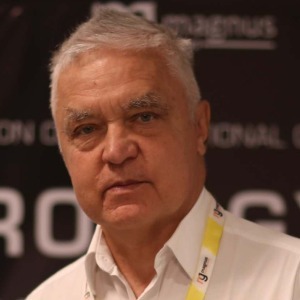Title : Personalized and Precision Medicine (PPM) as a unique healthcare model and a Strategic case to secure the human healthcare and wellness via Re-shaping ecosystems and stabilizing the climate
Abstract:
Personalized & Precision Medicine (PPM) whilst playing a crucial role in the modern healthcare services, it is already an important topic in public and private health care debates with clear importance in the future. PPM uses methods of molecular analysis in order to identify genetic mutations and to evaluate each individual's risk of contracting a given disease. The measurement of complex environmental factors that exert pressure on our health has not kept pace with genomics and historically has not provided a similar level of resolution. Most diseases result from the complex interplay between genetic and environmental (exposomal) factors. The exposome is an OMICS-scale characterization of the non-genetic drivers of health and disease. With the genome, it defines the phenome of an individual.
Mapping the exposome is ultimately about understanding the divergence between our genetic predispositions and our biological reality. It requires not just studying environmental chemicals, it is about studying all of the chemicals, endogenous and exogenous alike, that influence human biology. Meanwhile, functional exposomics to associate environmental exposure to phenotype complements functional genomics linking genotype to phenotype. For instance, risk and progression of common, non-communicable diseases, crucially depend on environmental and behavioural factors rather than genetic ones! For effective risk identification, we will actually need to integrate genetic effects with environmental exposures. A broader understanding of disease that includes gene-environment interactions would enable individuals and healthcare providers to realistically see genetics as just one of a suite of precision tools to achieve healthier living, rather than an a powerful method to reliably predict future disease!
The concept of “PPM” refers to the possibility of fine-tuning diagnoses and therapies to the bioprofile of each patient. The PPM-based Ecosystem, for instance, is a strategic initiative from the PPM-related Scotland - Innovation Centre that brings together healthcare, life sciences and academic organizations that want to align their activities through partnership to deliver PPM programs more efficiently and effectively. With the help of computational health sciences and as the knowledge network is developed, patients and providers will be able to see how environmental, social and behavioural factors relate to the patient in front of them.
The exposome concept is maturing and gaining increasing applications in human and wildlife studies. Significant progress has been made in multiple areas but there are still multiple obstacles to actionizing the exposome to directly benefit patients and contribute to disease prevention. Working together across disciplines, we can actionize the exposome to increase our understanding of the etiology of chronic heterogeneous and multifactorial diseases toward the goal of intervention and future disease prevention.



